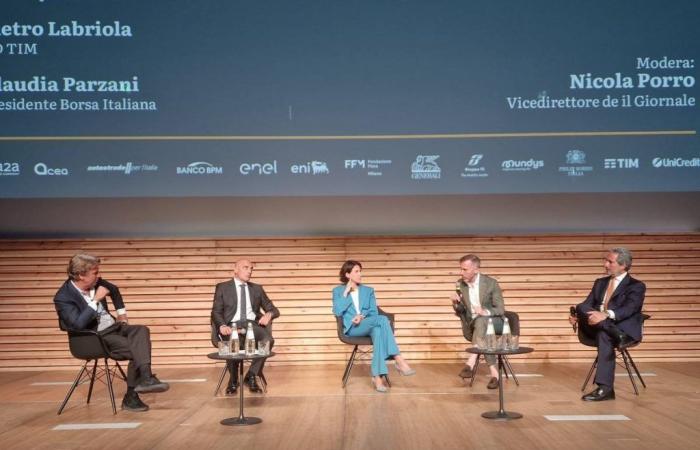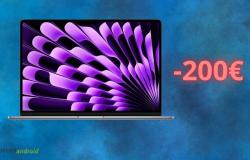Artificial intelligence, with its innovations, advances. It expands, grows, develops unexpected and imponderable capabilities. To best grasp the potential offered by technology, however, a “paradigm shift“. At the Milanese event for the 50th anniversary of the newspaper, our deputy director Nicola Porro moderates a round table dedicated to ongoing developments. They will discuss the topic Pierroberto FolgieroCEO of Fincantieri, Marco HannappelCEO of Philip Morris Italy, Pietro LabriolaCEO of TIM, Claudia Parzani, President of the Italian Stock Exchange. An exceptional audience to delve into the decisive aspects of the changes underway and to understand how the great protagonists of Italian entrepreneurship and the Italian economy are adapting to them.
Porro opens the panel by pressing Labriola. “What’s up with Tim.” And he: “Tim has set the closing for the sale of Netco to Kkr. This will allow us to reduce the level of debt and eliminate those bureaucratic constraints that did not allow us to compete with the other players; constraints that were anachronistic. From the second July we will no longer have these constraints and we will become like all the other operators”. Parzani: “Today there is more reasonableness in choosing the stock exchange than in the past. The stock exchange must be a bridge between companies and investors. Italian stock exchange, in a country of entrepreneurs like ours, could grow even more. And then, why can’t we be the hub of food and beverage or luxury, that is, sectors in which Italy is appreciated?” And again: “There is a theme of rules, we have processes and procedures that have taken longer than other countries. We are moving in the direction of greater simplification and this is a significant aspect. At the same time, institutional investors are needed with a greater role in order to direct more financing in the medium and long term to support the industrial fabric of the country.”
Word ad Hannapelalways on the topic of rules and the choice of Philip Morris to invest heavily in Italy. “We are among the largest foreign investors in Italy in the last decade. In Crespellano, in the province of Bologna, the largest factory of the last century in Italy was built: equal to 33 stadiums of San Siro. And it is the result of over 1.2 billion in investment, exports to over 40 countries around the world and is the center of not only an industrial but also an agricultural supply chain. In 2013 there was uncultivated land, today there is a plant that exports to the world and that it is a hub capable of gathering Italianness. The pillar is the investment of a serious multinational that invests in Italian agriculture, in research and development with the largest center in the world for our company. With investments, 41 and a half thousand people point of National GDP, in Italy we have built an integrated supply chain of excellence. There is an Italy that is improving, whereas countries like France are starting to have thoughts of instability. For those who, like us, make products that didn’t exist on the face of the earth, producing where there is a genius works.”
“The production plant in Bologna has high levels of quality and this counts, because it is the people and the Italian spirit that make the difference. Our bureaucracy still represents a difficulty, but on the other hand there is the Italian spirit in the values engineering and agriculture. We know jobs like no one else in Europe,” adds Hannapel.
“The challenge is how to keep complexity in the West. Green regulation is a cross for shipowners but a source of distinctiveness for the industry. Our new frontier is to integrate everything that is in the logical domain of the ship, to study the behavior of the ship turn it into data and make decisions,” he says Pierroberto Folgiero, CEO of Fincantieri. “The ship is made by Fincantieri with its entire supply chain. And there is the Italian touch, throughout the supply chain. We still make luxury ships. We are making the Four Season ship”.
Labriola: “In a country like the USA we have 3 TLC operators, in China and India 3 or 4 operators. In Europe more than 100. We have to build 100 overlapping telecommunications networks. In 1993, when I graduated, in every country there it was a telecommunications operator, then it was thought that competition would lead to development. Today, what is the situation? the costs and revenues of all Italian operators, there is no profit. As Europe we have been more realistic than the king, imposing constraints that they do not have outside. The path of liberalization this has not happened in other sectors, this has led to an anomalous situation that can only be reversed by allowing operators to get together, but today this is prohibited. TLC in Italy was a sector with watertight compartments, today there is no longer this division: WhatsApp is also used to make calls, but guess who pays for the telephone numbers used? We operators”.
Parzani: “The numbers of the Italian stock exchange have grown and choices have been made that have brought investments to Italy. We cannot stay in a market that does not play a European game, otherwise we exclude ourselves from the gaming table.”
Second round of questions. And it’s up to Hannapel again, questioned by Porro onartificial intelligence. “It already exists and is under great development, it must be regulated and managed as a tool. Ours is an ultra-generation plant, we make complex products that require billions of dollars of research and development. Artificial Intelligence will be able to help, but the The growth of machines must go hand in hand with that of humans. The machines that make the finished product, here, are 80% Italian”. And again: “Who wouldn’t want a factory like ours? The patent can be moved, but two things guarantee the future of a plant like this: how much Italy matters on an international level and then the people. We have to put our muscles together, that is the factory, and the brain, or the research and development“.
Porro gives the floor to Folgiero: “To remain the second largest manufacturer in Europe we must acknowledge that many things can be done without hands, but not manufacturing. This issue must be taken very seriously. Having a manufacturing capacity means taking things very seriously. the topic of work. We have been looking for guys to come and be specialized welders to manage a new robotic jumper. We have received 17 thousand applications and if we work on it.automation, this works. Regarding low added value activities, in Ghana we have opened a school of welders which we will bring to Italy in a disciplined manner with the flows decree.
Going to the construction site is a job that has a lot of future inside, of interface with the machine, in the awareness that a share of the work must come from abroad, also thought of in an ‘Olivettian’ way and with the commitment to think of these people even when they leave the construction site. This means taking the issue of work seriously.”






